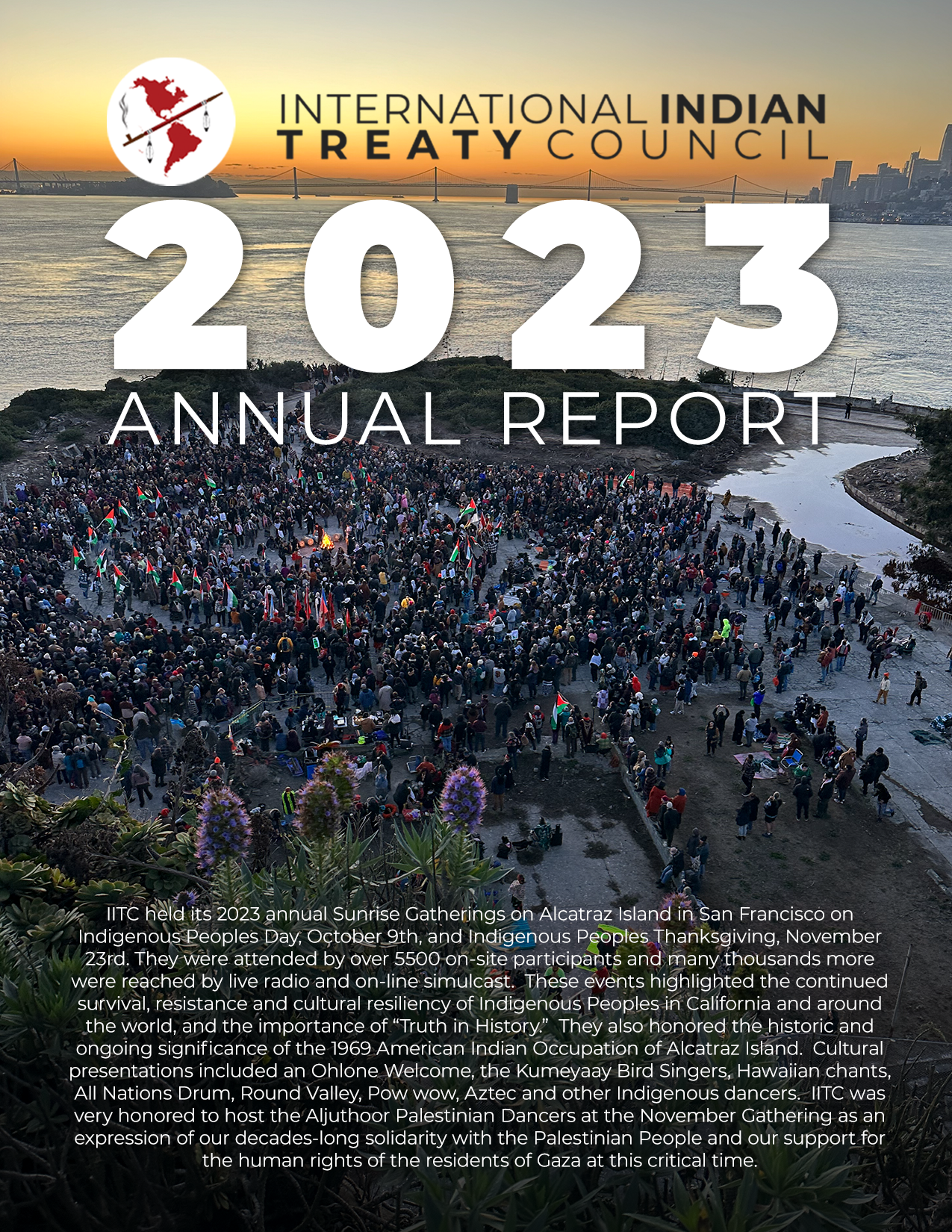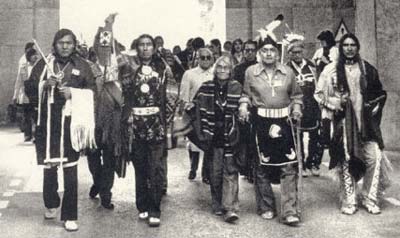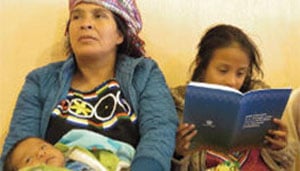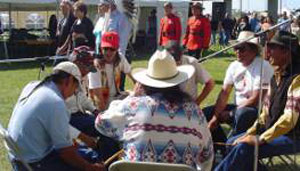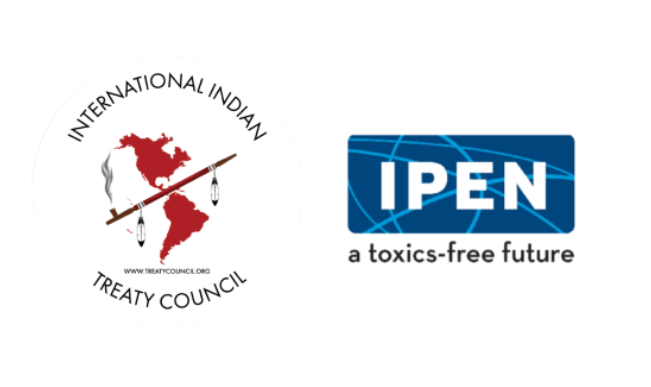
Geneva, Switzerland- At the Minamata Convention negotiations Tuesday, delegates approved a resolution calling for support to the participation of Indigenous Peoples in the fight to end mercury pollution. The resolution urges the Parties to engage Indigenous Peoples in mercury elimination efforts and notes that future negotiations should include a focus on “the needs and priorities of Indigenous Peoples, as well as local communities, with regard to the effects of mercury in their health, livelihoods, culture and knowledge, with a view to future work on identifying possible solutions.”
“This is a monumental achievement for Indigenous Peoples globally,” said Rochelle Diver, U.N. Environmental Treaties Coordinator. “The Minamata Convention was the first multilateral treaty to be negotiated after the adoption of the UN Declaration on the Rights of Indigenous Peoples but at that time States failed to acknowledge our unique political status. This is the first step in truly respecting and upholding our rights.
Noting the extremely harmful effects from mercury pollution, the International Indian Treaty Council, IPEN, and other global health and environmental advocates are calling on the Convention to adopt an end to the global trade in mercury and a global ban on the use of mercury in mining. The US and the EU have already prohibited mercury exports, but there is much mercury still traded, and most of it ends up in small-scale (sometimes called “artisanal”) gold mining. Heavy use of mercury in mining still occurs in Latin America, parts of Africa, and Southeast Asia.
Mercury in small-scale gold mining is the leading source of global mercury emissions, resulting in contamination of the food web and undermining the human rights of Indigenous Peoples. Yet current loopholes in the Convention allow the continued use of mercury. Advocates are calling on the convention to send a clear message that mercury use will no longer be tolerated in mining by adopting a global ban.
“Without strong global action to ban mercury in mining and end the mercury trade, the Convention is sending a signal that gold extraction is more important than human rights,” said IPEN Policy Advisor Lee Bell, speaking from the Minamata meetings in Geneva. “We urge delegates to take up these issues at the next negotiating and once and for all adopt decisive global policies to end the health and environmental threats from the largest source of mercury pollution.”
In support of Indigenous Peoples’ active participation, the Minamata resolution yesterday noted,
“Indigenous Peoples, as well as local communities, are particularly vulnerable to mercury exposure and are among the first to face the serious health and environmental effects resulting from mercury pollution owing to their close relationship with the environment and its resources, and welcoming the role of Indigenous Peoples, as well as local communities, and particularly the engagement of women and girls, who have faced the effects of mercury with resilience, in achieving the objective of the Minamata Convention on Mercury…”
In a plenary intervention at the Convention meetings, Yuyun Ismawati from the Indonesian public interest group Nexus3 stated, “Most mercury being traded finds its way into small-scale gold mining. But most products that relied on mercury have been phased out, so there is little justification to continue the global mercury trade… Supporting the Bali Declaration to combat the illegal trade of mercury launched by Indonesia at COP4, IPEN invites delegates to consider amending Article 7 at COP6 and ending mercury trade globally, especially for its use in the mining sector.”
A 2022 UN report on “Mercury, small-scale gold mining and human rights” noted the harms to Indigenous People from the use of mercury in mining, stating that
“The human rights of Indigenous Peoples, including those living in isolation, are being trampled in the rush to extract gold… Indigenous Peoples are heavily affected by the contamination and violence associated with the small- scale gold mining activity…. A notable complaint of many Indigenous People is the loss of food sources from deforestation and [mercury] contamination of fish in the rivers.”
Share this post
Minamata Convention Calls for Inclusion of Indigenous Peoples in the Fight to End Mercury Pollution
Geneva, Switzerland- At the Minamata Convention negotiations Tuesday, delegates approved a resolution calling for support to the participation of Indigenous Peoples in the fight to end mercury pollution. The resolution urges the Parties to engage Indigenous Peoples in mercury elimination efforts and notes that future negotiations should include a focus on “the needs and priorities of Indigenous Peoples, as well as local communities, with regard to the effects of mercury in their health, livelihoods, culture and knowledge, with a view to future work on identifying possible solutions.”
“This is a monumental achievement for Indigenous Peoples globally,” said Rochelle Diver, U.N. Environmental Treaties Coordinator. “The Minamata Convention was the first multilateral treaty to be negotiated after the adoption of the UN Declaration on the Rights of Indigenous Peoples but at that time States failed to acknowledge our unique political status. This is the first step in truly respecting and upholding our rights.
Noting the extremely harmful effects from mercury pollution, the International Indian Treaty Council, IPEN, and other global health and environmental advocates are calling on the Convention to adopt an end to the global trade in mercury and a global ban on the use of mercury in mining. The US and the EU have already prohibited mercury exports, but there is much mercury still traded, and most of it ends up in small-scale (sometimes called “artisanal”) gold mining. Heavy use of mercury in mining still occurs in Latin America, parts of Africa, and Southeast Asia.
Mercury in small-scale gold mining is the leading source of global mercury emissions, resulting in contamination of the food web and undermining the human rights of Indigenous Peoples. Yet current loopholes in the Convention allow the continued use of mercury. Advocates are calling on the convention to send a clear message that mercury use will no longer be tolerated in mining by adopting a global ban.
“Without strong global action to ban mercury in mining and end the mercury trade, the Convention is sending a signal that gold extraction is more important than human rights,” said IPEN Policy Advisor Lee Bell, speaking from the Minamata meetings in Geneva. “We urge delegates to take up these issues at the next negotiating and once and for all adopt decisive global policies to end the health and environmental threats from the largest source of mercury pollution.”
In support of Indigenous Peoples’ active participation, the Minamata resolution yesterday noted,
“Indigenous Peoples, as well as local communities, are particularly vulnerable to mercury exposure and are among the first to face the serious health and environmental effects resulting from mercury pollution owing to their close relationship with the environment and its resources, and welcoming the role of Indigenous Peoples, as well as local communities, and particularly the engagement of women and girls, who have faced the effects of mercury with resilience, in achieving the objective of the Minamata Convention on Mercury…”
In a plenary intervention at the Convention meetings, Yuyun Ismawati from the Indonesian public interest group Nexus3 stated, “Most mercury being traded finds its way into small-scale gold mining. But most products that relied on mercury have been phased out, so there is little justification to continue the global mercury trade… Supporting the Bali Declaration to combat the illegal trade of mercury launched by Indonesia at COP4, IPEN invites delegates to consider amending Article 7 at COP6 and ending mercury trade globally, especially for its use in the mining sector.”
A 2022 UN report on “Mercury, small-scale gold mining and human rights” noted the harms to Indigenous People from the use of mercury in mining, stating that
“The human rights of Indigenous Peoples, including those living in isolation, are being trampled in the rush to extract gold… Indigenous Peoples are heavily affected by the contamination and violence associated with the small- scale gold mining activity…. A notable complaint of many Indigenous People is the loss of food sources from deforestation and [mercury] contamination of fish in the rivers.”
